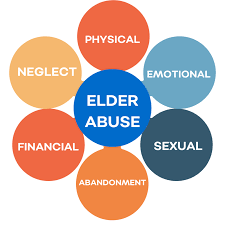 World health organization, definition is a violation of an older adults fundamental rights to be safe and free from violence.
World health organization, definition is a violation of an older adults fundamental rights to be safe and free from violence.
Includes mistreatment by physical abuse, sexual abuse, psychological abuse, caregiver neglect, and financial exploitation.
Elder mistreatment refers to intentional actions that cause harm or create a serious risk of harm to an older adult by a caregiver or other person who is in a trust relationship to the elder, or failure by a caregiver to satisfy basic needs work to protect the older individual from harm.
Elder abuse mistreatment may include physical, sexual, emotional, or psychological abuse, neglect, abandonment, and financial or material exploitation.
Previous research suggests prevalence varies between 5-30%, but recent estimates suggest that one in 10 older adults experience physical, psychological, sexual, neglect, and financial exploitation.
Annual prevalence range from 700,00 to 2.5 million in the U.S.
Suggested that 10% of elderly persons experience such abuse.
Only a small fraction of elder abuse is reported to appropriate agencies.
Increasing trend.
It is associated with morbidity and mortality among vulnerable populations.
Consequences of elder abuse include: anxiety, distress, depression, high risk of placement in nursing homes, and death.
Associated with increase risk for hospitalization (Dong X et al).
Self neglect refers to the behavior of an elderly person that threatens his/her own health and safety and manifests as refusal or failure to provide oneself with adequate food, water, clothing, hygiene, shelter, safety precautions, and medications.
Self neglect is the most common form of the elder mistreatment encountered and is difficult to distinguish between elder abuse.
